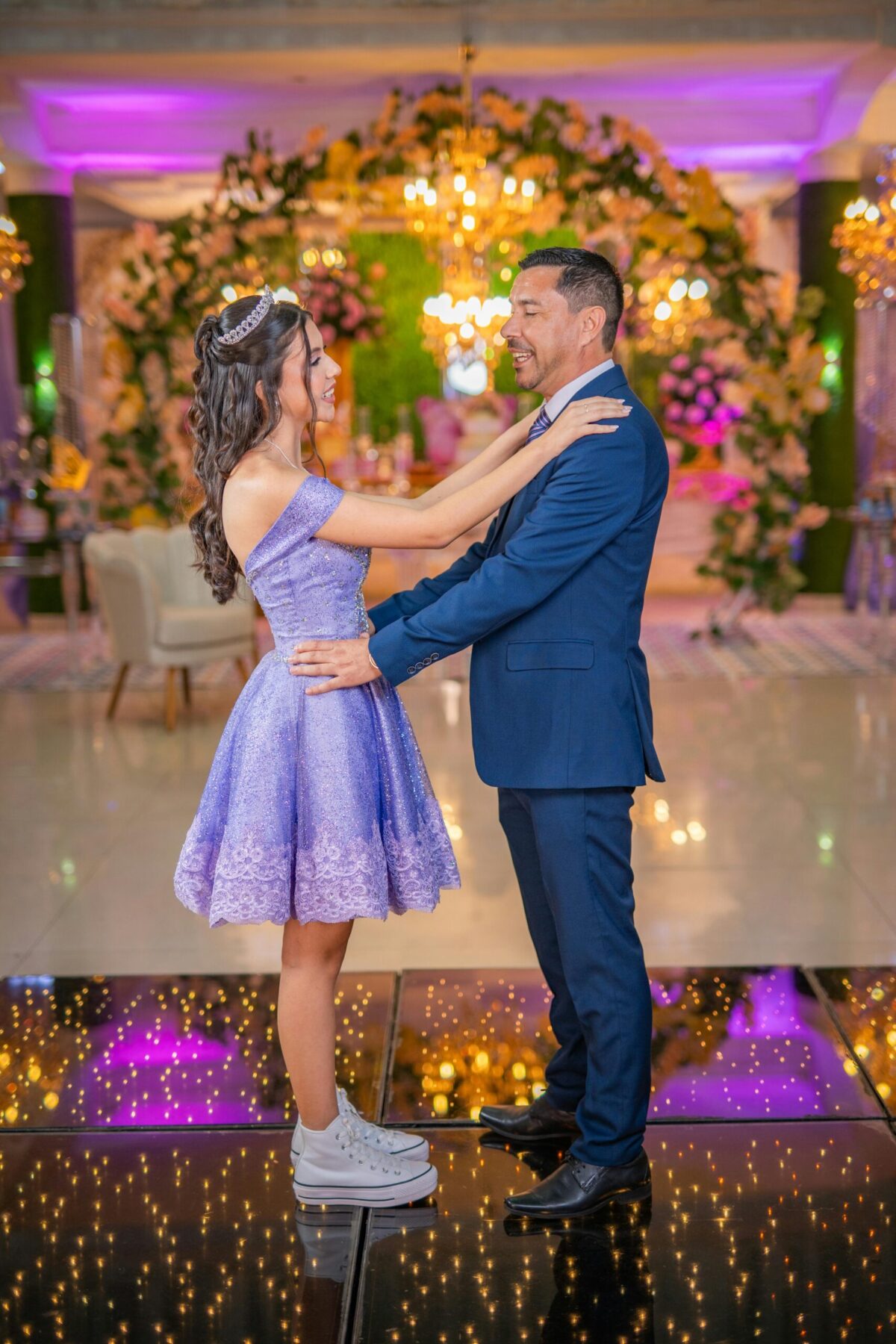
How Divorce Changes the Father-Daughter Dynamic
It might surprise some to hear this from a woman, but after nearly a decade of coaching fathers through divorce and co-parenting, I’ve seen firsthand the unique challenges men face, especially when raising teenage daughters without Mom in the middle. Many dads, even the most loving ones, have spent years taking a quieter role during their daughter’s formative years, trusting their partner to lead that delicate dance. But once divorce shifts the dynamic and fathers find themselves in one-on-one time with their daughters, the discomfort can be overwhelming for each. Suddenly, there’s no buffer. Just awkward silence, mutual frustration, and a father wondering why his daughter no longer wants to visit.
And here’s the truth: it’s not because he’s doing something wrong, it’s because he doesn’t know where to begin. I’ve worked with fathers who were desperate to connect, trying everything from buying favorite snacks to giving space to asking their ex for answers. None of it seemed to work. But the solution isn’t about fixing something, it’s more about making a bridge. This blog is meant to support fathers who feel unsure, rejected, or unprepared to build new bonds with their teenage daughters post-divorce. Look, you’re not the only one to have ever gone through this situation. There is a way forward and it starts by daring to connect, even when it feels awkward, unfamiliar, or uncomfortable. Let’s walk that path together.
Co-Parenting Without Mom: Reconnecting With Your Teenage Daughter
Fathers and teen daughters – when Mom is no longer the buffer. This is one I see as the biggest challenge. A lot of fathers have taken a backseat during the marriage and allowed themselves to sit back while their wife has taken a stronger bonded role with their teenage daughter because they believe they have nothing to say to them and nothing in common to share. Then suddenly, they are alone with them and both are miserable.
Next thing you know, there is a teenage girl not wanting to visit her father, and a father feeling rejected and at a loss for what to do. He buys her favorite foods and clothes, tries to give her some independence and space, and asks her mother what he is doing wrong, but nothing improves. This is a tough one that takes more than just a small effort. Sometimes getting a family therapist involved is helpful to rebuild the relationship between the teen daughter and father and help them navigate together new shared interests to find ways to bond together. Sometimes the father working with a coach to get ideas is helpful. Sometimes it is a father not setting up obstacles by stating to himself that he cannot relate to his teenage daughter because he was never a girl and it is too complicated. It may take doing some reading and even trying out some of the things she likes doing, even if it is trying out new make up trends on Tik-Tok with her! Trust me, once the awkwardness is over, the two of you will be laughing and bonding like never before!
I worked with one father who said he felt completely lost on what to even say to his teenage daughter and didn’t know what “feminine stuff” to stock his house with and was too afraid to talk with her. I encouraged him to make it funny and just sit down with her with a big list that said “FEMININE STUFF” at the top and tell her that it is her home too and he wants her to feel comfortable so she can either make a detailed list or he can take her to the store and she can stock up and he can be with her or disappear somewhere else while she stocks up the cart and he will meet her at the checkout. He did it and they ended up laughing a lot about it once he broke the ice this way, which was a first step toward them finding their footing together in their “new normal”. There was of course a lot more coaching we did together, but him making her feel at home with him was key to letting her know that he wanted to meet her needs and be sensitive.
Coaching is a powerful first step and as another resource, the National Center for Fathering gives simple and practical tools to build or rebuild that connection even when it feels awkward.
The Equal Role of Fathers in Co-Parenting
Believing that a mother’s role is more important than a father’s role. I have heard this during Parenting Time negotiations when a father says to me, “It’s okay for her to have the majority of time, she is the mother and she is more important.” If there are other reasons underlying, such as the father recognizing that his work schedule is truly not conducive to him having the children an equal amount of time, or he really knows himself and he cannot handle the children that much on his own, I leave it alone, but if it is because he really believes that he is the less important parent, it is concerning to me that he does not understand the value of his role. Don’t believe me? Here is just a tiny drop of the research on the subject and I encourage you to search more because you will easily find it:
Emotional and Behavioral Benefits of Strong Father-Child Relationships
Children who maintain strong relationships with their fathers after divorce tend to have:
Lower levels of depression and anxiety.
Fewer behavioral problems, such as aggression or delinquency.
Greater emotional stability and resilience.
Source: Amato & Gilbreth (1999) – Nonresident fathers and children’s well-being: A meta-analysis.
This does not happen magically though. Fathers must create an emotionally and physically safe and secure space for their children just like any parent. That can be done through spending quality time together, putting their needs as a priority, and setting up routines and structure – something that all children need the most.
Here are great ways to begin rebalancing responsibilities, How to Divide the Parenting Roles: Before and After Divorce. It’s a guide to redefining parenting roles in a way that supports your child’s well-being and your own growth as a father.
The Trap of Fun Over Structure: Divorced Dads Need Routines
I was coaching one father who was so busy trying to make his home a fun place that his children would enjoy spending time at with him, that he completely missed the importance of the safety of routine and structure for the children. The vegetable drawer in the refrigerator was filled with a ton of candy from Costco. The children had no bedtime and healthy food was rarely given, but there were plenty of times after hours of video games on all the brand new consoles and screens that they made various flavors of rice krispie treats. Homework was rushed on Sunday nights before returning to school on Monday morning. Electric scooters were purchased – with no helmets, and the kids pulled over by the police when riding them unsupervised in the street rather than the sidewalk. Emails from the angry Co-Parent went ignored.
We had a lot to tackle, but I coached him into working back into creating a more balanced environment dominated by healthy routine and structure with some balance of fun and a little junk food sprinkled in. We did a lot of education on child development together as well as the importance of a healthy and low conflict Co-Parenting relationship and how that can positively impact the children. Several years later, he still keeps in touch and laughs with me about his falling into the trap of trying to please his children rather than being a parent.
For more on managing boundaries, routines, and communication after divorce, A Guide to Overcoming Common Co-Parenting Challenges helps parents move from reactive to intentional co-parenting.
For some reason, people think this just happens with fathers, but I have seen this with plenty of mothers as well, There is nothing to be ashamed of! It is hard to know what to do when you feel like your children’s world has just fallen apart and you are one of the people responsible for it.
That is why I do re-framing with clients about divorce and children and try to get them to see this does not have to be the end of the world for their children. They can grieve in a healthy way and be emotionally healthy, as long as their parents are acting in a healthy manner.
Helping Fathers Build Emotional Connection After Divorce
Much of the research about the positive impact of fathers is connected to a father’s emotional availability and parenting style. This is the last area I would say that can be a struggle for fathers as they were raised with societal norms for men that were different than women. Most young boys were taught to “be tough” and not to cry. They were treated with more authoritarian parenting than their female counterparts, so their way of parenting may be more in line with a parenting style that was used with them.
Those patterns may need to be unlearned because if they have these traits and parenting styles and no longer have their female counterpart (or in a same sex marriage, the counterpart that is more emotionally available), it can be very difficult for the children to adjust and feel fully emotionally safe.
This is not something that is just unique to men I must point out though. There are just as many women who lack the ability to be emotionally available to their children and suffer without their father around who was the more emotionally available parent. I just mention this related to men because they are often the ones who were raised with skewed ways of being encouraged to hide their feelings as little boys to appear tougher.
I coached one father who felt lost because he noted to me that it was his ex-wife who was the nurturing one and he was just the playful one and didn’t deal with the “feelings stuff”. We talked through why that was, and how he could reach into himself and build an action plan to get in touch with his own resistance to being open to sharing feelings to be more naturally open with his children.
We role played various scenarios many times over. When the opportunity arose for him at home, he was ready and confident and felt so pleased at his ability to respond in a nurturing manner. He had it in him all along – he just needed to exercise the muscle that had been dormant in him to get ready for the big race!
For a deeper dive into this topic from my perspective as a Co-Parenting Specialist, check out my related piece: Unique Challenges for Men in a Co-Parenting Relationship where I explore the overlooked emotional hurdles fathers face—and the double standards they often endure.
I am sure there are men who can contribute much more to this list, and these are only a few of the top challenges I see, but I want to say to fathers as I say to all parents that just being there and giving your child a sense of love, safety, and security is the most important goal, and truthfully the one that you have probably already accomplished – so stay positive because you can do this!




